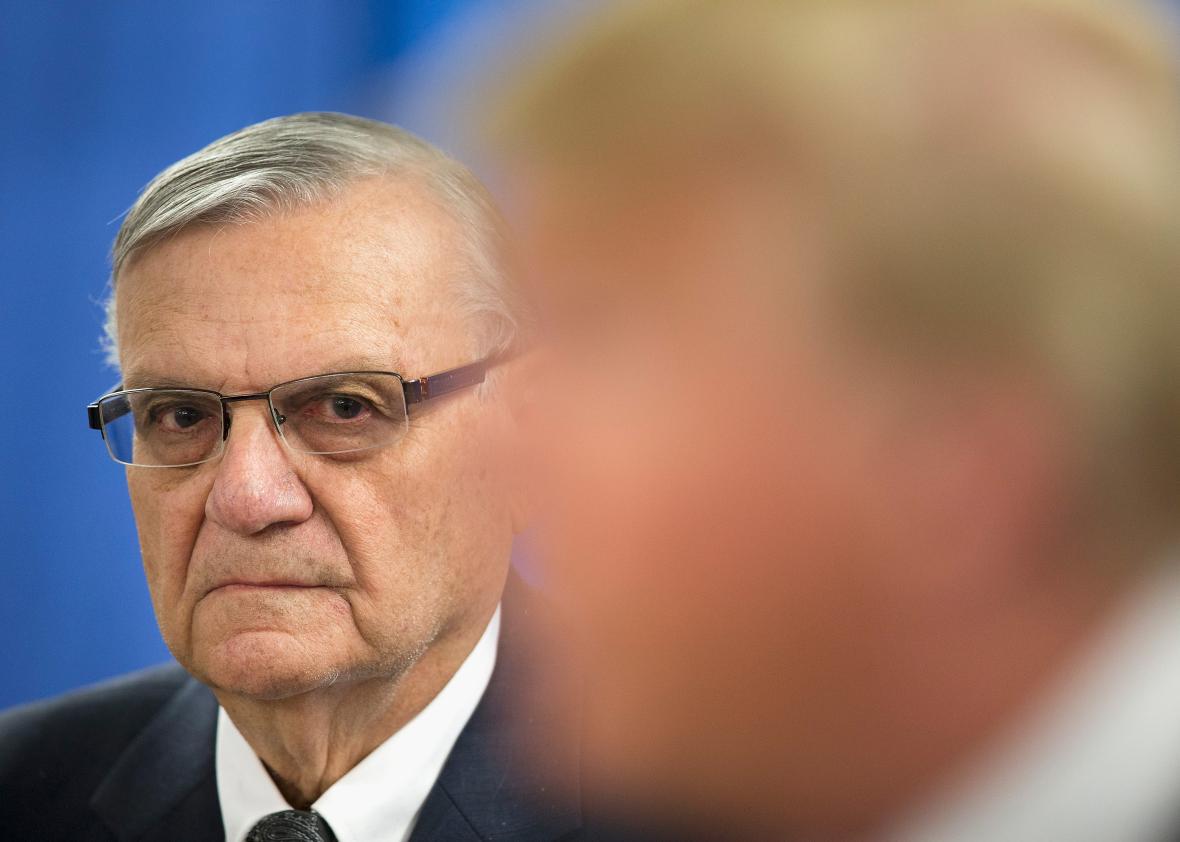When President Donald Trump pardoned Sheriff Joe Arpaio on Friday, he tweeted that the sheriff was an “American patriot” who “kept Arizona safe!” His pardon was, in one sense, narrow: Arpaio was not convicted for his relentless and well-documented brutality, but for criminal contempt after he violated a court order demanding that he stop illegally detaining Latinos. In another sense, however, Trump’s pardon—which was accompanied by a White House statement praising Arpaio and eliding his misdeeds—broadly condones the sheriff’s relentless criminality. It sends a message to Latinos that they do not deserve equal rights, and affirms to the judiciary that Trump has no respect for the rule of law.
But Trump’s pardon of the sheriff is also troubling for its timing. The political nature of the pardon is obvious; it vividly demonstrates Trump’s willingness to abuse his presidential powers in order to let his friends and supporters off the hook. But just as notable is that it came right on the heels of the president’s Phoenix rally, as the president is being pressured to disavow the most racist elements of his base. What’s even worse is the fact that the pardon arrived without review, and before Arpaio was even sentenced for defying the courts. As my colleague Dahlia Lithwick has written, Arpaio’s conviction was a test for how long and how willing Trump will be to abide judicial oversight. He flunked it. It now seems clear that many future beneficiaries of the president’s clemency will be his political allies—and that he might not wait to for them to be convicted or sentenced before issuing a pardon. Trump, in other words, may use his pardon power to stymie Robert Mueller’s investigation, as well as other inquiries into the past misdeeds of his associates.
The commonalities between Arpaio and Trump are striking. Both men disdain the rule of law, and Arpaio’s unrestrained racial profiling and harassment of perceived enemies—he arrested journalists who wrote about him critically—all sound like true expressions of Trump’s own deep desires. Trump and Arpaio were first drawn to each other over their belief that President Barack Obama’s Hawaiian birth certificate was forged. (Somehow, Arpaio found the money to send an investigator to Hawaii, who concluded, falsely, that the certificate was fraudulent.) Their bond deepened during the campaign: Arpaio endorsed Trump early, then stumped for him and appeared at campaign events where the two men lauded each other for their hatred of undocumented immigrants. In 2016, Glenn Thrush called Arpaio “Trump’s political godfather” and described the sheriff’s profound affection for Trump. The two shared startlingly similar bigotries, biases, and strongman instincts.
It’s no surprise, then, that Trump wished to pardon Arpaio. But it is genuinely shocking that the president followed through, and did so in this manner. There has long been a careful procedure in place for the pardon process: Individuals submit a request for clemency, and the Justice Department recommends good candidates based on pre-approved guidelines. Trump didn’t bother even to pretend to use this system to pardon Arpaio. The sheriff hadn’t formally requested one, the usual first step in the process. And he hadn’t yet been sentenced. Typically, an individual’s sentence plays a key role in the president’s clemency decision; President Barack Obama, for example, commuted the sentences of many prisoners who, he felt, had served enough time. Trump didn’t need to wait for a sentence.
And here is the frightening thing: The Mueller investigation has been serving subpoenas through a grand jury, most recently for firms associated with former Trump campaign manager Paul Manafort. What would happen if subjects of Mueller’s subpoenas don’t comply? They would be held in contempt, just as Arpaio was. And we’ve seen how little respect Trump has for judges who hold his friends in contempt. (Michael Flynn has been subpoenaed by the Senate, which would have to find him in contempt of Congress.) What about Trump’s other associates who may soon be pulled into Mueller’s probe? Why should they cooperate with the investigation? If they do, crimes might be revealed, making it more politically difficult for Trump to pardon them. If they don’t cooperate, they will merely be held in contempt of court—allowing Trump to step in with a pardon, publicly dismissing the charge as a witch hunt. Contempt is an essential enforcement tool that the judiciary can use to keep investigations from stalling out and to help ensure the progress of justice. Trump is effectively nullifying that tool. By pardoning those who defy court orders, Trump would be able to continually frustrate the investigation and prevent Mueller from uncovering the truth.
A chain of events like this, of course, would be obstruction of justice, an impeachable offense. But it seems unlikely that Republicans would move to impeach Trump for obstructionist clemency. He has, after all, an unquestionable right to issue pardons; the GOP could defend his actions as an unsavory but fundamental component of executive power. The Constitution provides only a political solution to obstruction of justice, which is no solution at all in a Republican-dominated Congress.
Trump and Arpaio share many dangerous beliefs, and given power, both men use it to shamelessly silence and impede their opponents. Trump has realized that he can use his pardon power to bypass the lawyers and judges and investigators he so despises. Arpaio was a test run. Now he will know it works.
